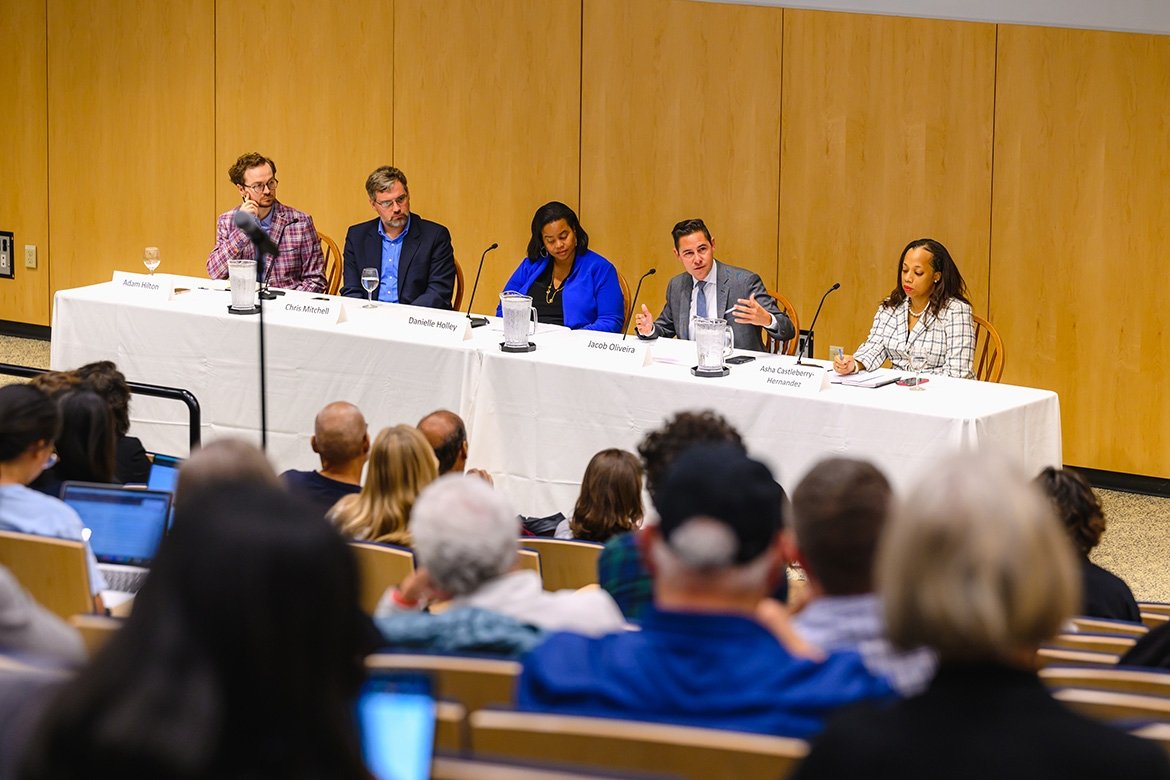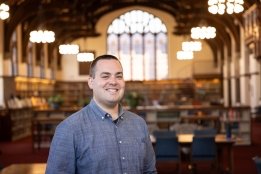Mount Holyoke College hosts panel on 2024 elections

In front of a packed crowd in Mount Holyoke’s Gamble Auditorium, a panel of legal scholars and political experts discussed what we could expect not only from the upcoming presidential election but also from more hyper-focused local races.
The nation is just two weeks away from an election that will culminate in a historic result. Either the United States will elect its first female president, or it will be the second time that a president has held two nonconsecutive terms. Leading up to the election, a panel of experts in law, international relations and politics answered questions at Mount Holyoke College and informed students, faculty, staff and members of the community on various topics, from election processes to legal battles.
Adam Hilton, associate professor of politics at Mount Holyoke College, was the first panelist to present, discussing the scenarios that can play out in such a close election.
“As many people who have been paying close attention to this election already know, the election for the presidency is too close to call. You could build a complicated election model. You could build a simple one. It all comes out the same. It is about a 50/50 shot,” Hilton said. “We do not vote directly for the president. In the United States, we vote for slates according to how many members of Congress they have, and that with almost very few exceptions, all states award the winner every elector [they have].”
Hilton also pointed to the fact that elections are not the only part of politics that matter — in fact, they’re a small part of a much larger picture.
“There’s a lot more to politics than just elections. Elections are a really important part, and this election is really important. I don’t want to undersell that. But beyond elections, there are things that we do that are, in a sense, the punctuation mark that gratify or alter or reconfigure existing state affairs,” Hilton said. “So, things like consciousness raising, things like movement building, things like alliance making, protest, litigation, et cetera. These are all things that happen in between elections and are often just as important as them.”
President and Professor of Politics Danielle R. Holley discussed the legal implications and challenges that come with an election, focusing on several examples that have already taken place, even this close to Election Day.
“Wisconsin students had text messages sent to them telling them that it was illegal to vote based on their college address and with threats to report them for voting under their college address, which is actually completely inaccurate. You can vote where you live with your college address,” Holley said. “Every person is entitled to their own private voting space. We have a couple of counties in North Carolina where they have been insisting that husbands go into the booth with their wives to vote.”
Holley also focused on existing anti-voter initiatives, especially those enacted after the 2020 election.
“We saw the Stop the Steal conspiracy, conspiracy theories about Dominion voting machines. What all of that led to was a tremendous wave of what I would call anti-voter legislation. So when we say anti-voter legislation, we’re talking about legislation that makes it harder to register to vote, legislation that makes it harder to actually vote,” Holley said. “If you think of the Georgia bill that was passed, in which it says that you can’t actually hand out water or food to anyone in line, that’s a very typical anti-voter piece of legislation. After the last election, we saw 356 anti-voter bills introduced nationwide.”
Jacob Oliveira represents the Hampden, Hampshire and Worcester district in the Massachusetts State Senate. Senator Oliveira brought the focus from the federal level to the state level, discussing the importance of being involved.
“The most important role in government is not that of a president, or US senator, or governor, or city councilor, or state senator, or state rep or Supreme Court Justice; the most important role that we have in government is the role of citizen,” Oliveira said. “I’ll encourage any one of you to get involved locally with a local candidate or pick up a clipboard, like I did when I was 18, and run yourself, because those elections are vital to our democracy, and they are vital to essential services that each one of us rely on.”
The event concluded with a question-and-answer segment for the audience with the panel, with questions ranging from Supreme Court appointments to international relations with China and the European Union.
The panel was organized by the McCulloch Center for Global Initiatives and the Department of Politics at Mount Holyoke College.
